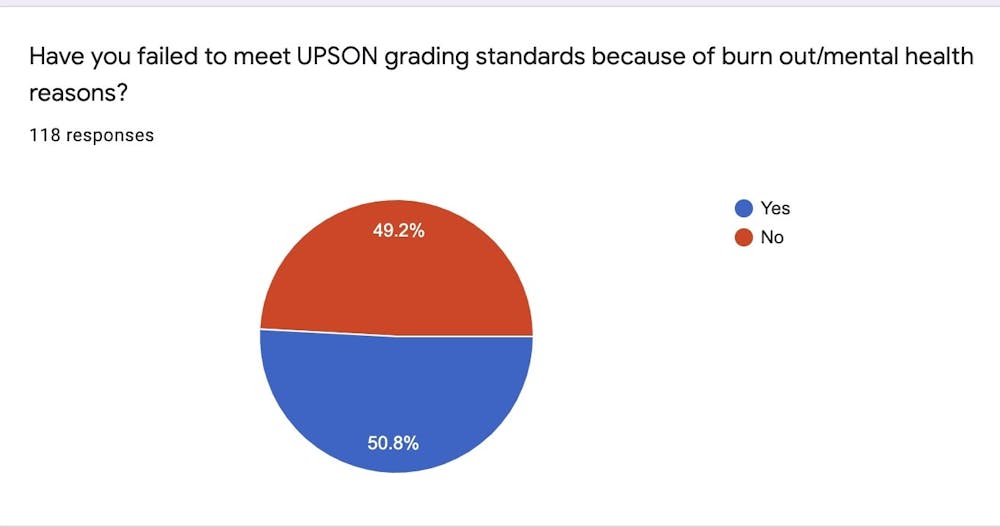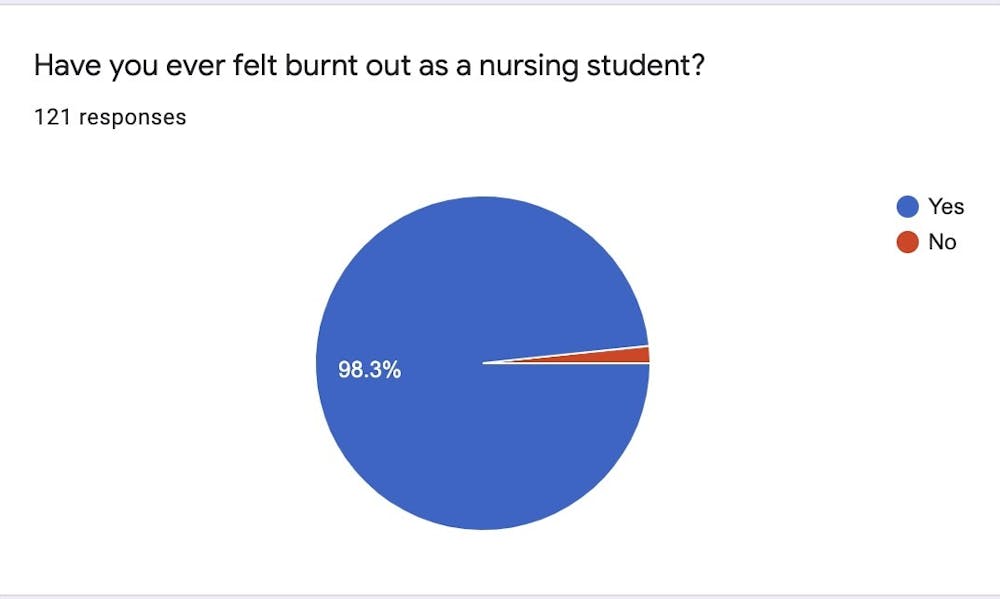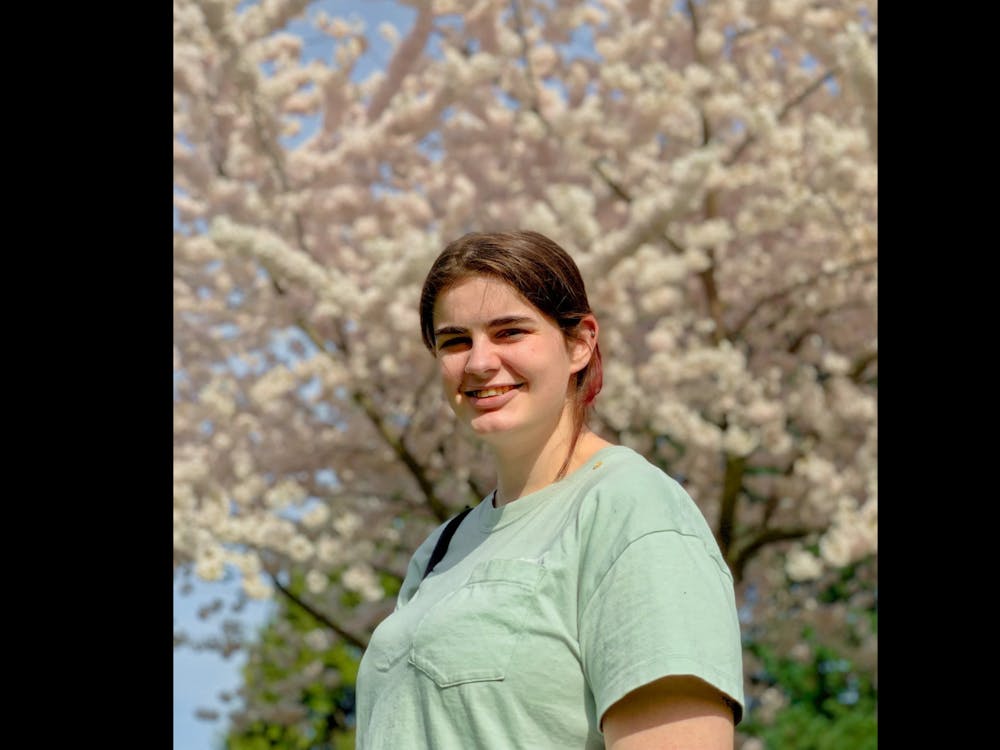As nursing turnover has reached an all time high of 27% in 2021 (compared to 19% in 2020), this culture of burnout is not unique to the hospital setting. The stress of nursing school has continued to get worse over the course of the pandemic and contributes to the worsening mental health of nursing students. A heavy workload combined with limited resources creates an absence of adequate self care, making resilience nearly impossible. Chronic stress has an active impact on the body, and studies have found a significant increase in depression, anxiety, insomnia, and psychological stress for health care providers throughout the COVID-19 pandemic. These statistics are reflected in nursing students as well.
On Founder's Day, Jaclyn Watoaka and Isaiah D’ Salutah presented their project of Resilience: Institutional Accountability During the Covid-19 Pandemic. Research and analysis showed how the nursing program uses the word “resilience” to place accountability on students for their own well-being in the face of oppression, furthering an individual’s responsibility for success.
“Resilience” in nursing courses has often been used to describe the perseverance of a population in the face of injustice, and is often applied to marginalized groups in a system not designed for their success. Isaiah read multiple emails from Dean Shillam that elaborated her use of the word “resilience” and the weaponization of the concept of self care in describing how we will cope with and prepare for 32 hours of out of class work in addition to 16 hours in class (as cited by the UPSON syllabus).
The Evidenced Based Practice Presentation, “Primary Presentation of Nurse Burnout: Creating Resilient Nurses From Day One” by Sophia Biondi, Dasha Efremov, Sophia Huston, and Janiece Moore has provided statistics that validate the negative effect of the pandemic and the neglect of the emotional well-being of nursing students.
Of 126 responses:
98.3% reported experiencing burnout
75% believed that UPSON has not addressed this prevalence through providing help and resources
-
62% of individuals reported a mental health crisis while attending UP

Image courtesy of Abigail Meyer.
A common response reported by students is that the workload and stress is justified by the idea that we are held to a higher standard because of our major. While this is true, the standard should not be one that prioritizes bettering yourself as a student and meeting grade requirements over mental health. The School of Nursing does not allow adequate time or resources to cultivate resilience or holistic well-being within their students.
Available resources at the University Of Portland include the Care Team and Health and Counseling Center; these are, however, inadequate in providing efficient patient care. While the HCC offers therapists and psychiatrists, along with 24 hour service and after hours therapy, counseling sessions are limited to 8 per student before being referred to outside care. Waitlists can be up to 1.5-2 months, and providers are limited in their ability to treat severe mental illnesses.
The Care Team is an often utilized resource initiated by concerned friends and teachers. However, the expectation of an individual in a mental health crisis to reach out and work with multiple individuals in a care team (especially online) is unrealistic, along with being in charge of and accountable for your own well-being.
The School of Nursing institution, policy, grade requirements, and course load is not designed for the success of a student with mental illness. My first 3 years of nursing school were severely impacted by an undiagnosed mental illness that I faced alone and untreated. Lower division was plagued by academic warnings, barely met requirements, and ongoing deterioration of my mental health. Despite the compassion and encouragement I received from individual professors, every semester presented the question of whether or not I was going to make it through this program.
The onset of the pandemic and course load of my junior year second semester curriculum led to my mental health crisis. A curriculum of Pathopharmacology 2, the Theology of Death and Suffering, and Acute Care accumulated into exams every Monday for 6 weeks on top of multiple assignments with zero allowance of extensions or exemptions. An overwhelming schedule, impossible standards, and the chronic stress and isolation of online school led me to weeks of depression that forced me to seek help. I was diagnosed with Bipolar Disorder, and I feel lucky to be alive to walk across the stage at commencement. Navigating the rest of the semester continued to become increasingly difficult; I was told the HCC was not capable of treating me and addressing my needs despite receiving many emails from different care teams throughout the semester encouraging me to utilize UP resources.
Before starting the fall semester of 2021, I met my advisor Dr. Chloé Littzen-Brown and told her about my previous struggles within my 3 years of nursing school. I asked for her support in navigating the acute phase of my illness while maintaining nursing requirements and financially supporting myself. She became my advocate, mentor and rock throughout this year. With her help and compassion, I was able to express vulnerability to my professors, ask for the help I needed, and finally feel supported in my senior year of nursing school.
Before this presentation and survey, I was unaware there were others who had been on similar journeys as mine. While I am comforted by no longer feeling alone and inadequate in a community of shared struggle, I am filled with frustration regarding the culture that has led to intense burnout felt by 98.3% of us.
Upon meeting with fellow senior nursing student Sophia Biondi, I found that my story was not an uncommon one. Struggling with mental illness throughout her entire life, junior year, she had a suicide attempt that led to hospitalization. She was admitted to an intensive outpatient program and diagnosed with Major Depressive Disorder, Generalized Anxiety, and severe ADHD. Though given extensions, she was still expected to meet the same standards, and faced many academic warnings that risked her spot in the program. Taking a year off seemed complicated due to the way it was presented by the faculty and the impact it had on her identity due to academic pressure.
Thankfully, Dr. Halina Wyss offered support and help in passing and maintaining her spot in the program. After finishing the therapy program, she was expected to “be better” and support herself. After a relapse in suicidal ideation in that same second semester of junior year, her request for an extension on an exam was denied — she was told to “figure it out.” Biondi is extremely grateful for the resources she has been able to access and the support of close friends and family, but recognizes that not all are so lucky.
“Approaching graduation, it is evident to me that the School of Nursing needs to do better in supporting their students, and adjust policy so future classes never have to persevere through what we had to face,” Biondi said.
Dr. Chloé Littzen-Brown and Dr. Halina Wyss epitomize how nursing faculty should support students through providing guidance, encouragement, and advocacy throughout the stress of nursing school.
The common theme presented by my peers is that the UPSON is responsible as an institution for addressing the mental health of their students and adequately providing resources and policy changes based on feedback.
Therefore, our recommendations are as follows:
Assigning one mental health professional (such as a psychiatric nurse practitioner) per class to specifically address needs and advocate for any student experiencing a mental health crisis.
Investing into advisor and advisor programs that allow for academic support and aid in success.
Encouraging better staff participation in student's mental health through bi-semester meetings with healthcare professionals to stay in touch with students.
Consulting mental health professionals/advisors as a part of emails, meetings regarding school standing, extensions and absences.
Instituting a mental health class to discuss the importance of mental health within the nursing program, allow direct connections, learn coping, and find alternative ways to handle stress.
Accommodating and recognizing the needs of students who face severe mental illness/ detriment to their well-being.
My vulnerability has always been met with kindness by the School of Nursing faculty; these inspirational individuals reflect the core of nursing practice that exemplifies compassion and empathy. To the UPSON professors, it has been an honor learning from you.
However, being supported by professors is not enough to enable true success due to limitations and values represented by the School’s current policies
The University of Portland School of Nursing has the capacity to reflect the compassion of their faculty through policy by listening to the pleas for change by students in the program. The failure to cultivate adequate resilience within the Class of 2022 is not a trend that needs to be upheld. To recognize and reject the normalization of burnout is to also recognize the healthcare system itself has become reliant on nurses to sacrifice their own health and well-being for the treatment and care of their patients with little institutional support. I respectfully ask the School of Nursing to hear the voices of myself and my peers, to listen to the research, and to respond accordingly. True to nursing teachings, overall well-being can be promoted by providing access to healthcare and treatment, tools for self care, and advocacy for change within institutions using evidence based practice. To improve healthcare and help those already on the frontlines means to provide us with the tools and support to prepare for what’s to come, ensuring that we will thrive in the face of adversity. This is the true definition of resilience.
Abigail Meyer is a senior at UP. She can be reached at meyera22@up.edu.
Sophia Biondi is a senior at UP. She can be reached at biondi22@up.edu.
Have something to say about this? We’re dedicated to publishing a wide variety of viewpoints, and we’d like to hear from you. Voice your opinion in The Beacon.








